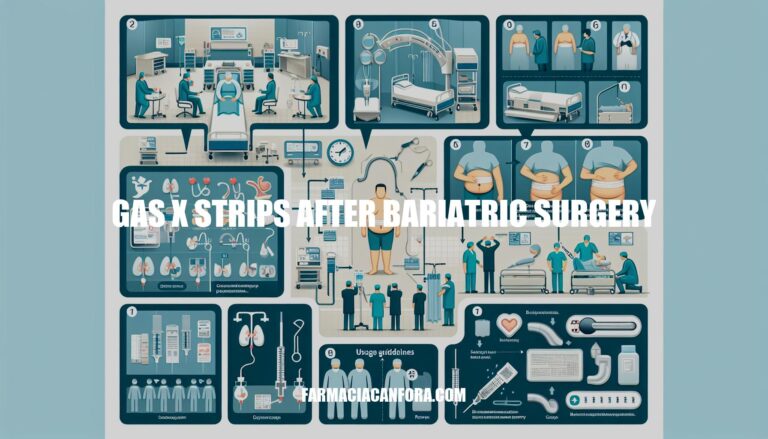


After bariatric surgery, managing post-operative gas pain and discomfort is crucial for a smooth recoveryGas-X Strips are a helpful tool in this process, as they dissolve on the tongue to quickly relieve gas pain and reduce flatulence. This can significantly improve comfort and aid in the overall healing process.
Gas-X strips are over-the-counter medication strips containing simethicone, which helps relieve gas and bloating. They work by breaking down gas bubbles in the digestive tract, making it easier for the body to expel them.
After bariatric surgery, patients often experience increased gas due to changes in their digestive system. Gas-X strips are recommended because they provide quick relief from gas pain and reduce the frequency of flatulence, helping patients manage discomfort more effectively.
Gas-X Strips offer several specific benefits after bariatric surgery:
These features make Gas-X Strips a convenient option for managing gas-related issues after bariatric surgery.
Here’s a step-by-step guide on how to properly use Gas-X Strips after bariatric surgery:
Consult Your Doctor: Before using Gas-X Strips, confirm with your healthcare provider that they are safe for you to use post-surgery.
Read the Instructions: Carefully read the instructions on the Gas-X Strips packaging to understand the correct dosage and usage.
Timing: Use the strips as needed when you experience gas discomfort. It’s often recommended to use them after meals or when you feel bloated.
Application:
Hydration: Drink a small amount of water after the strip has dissolved to help it work more effectively.
Monitor Your Symptoms: Keep track of your symptoms. If you notice any adverse effects or if the strips do not alleviate your gas discomfort, contact your healthcare provider.
Avoid Overuse: Do not exceed the recommended dosage on the packaging or as advised by your doctor.
Dietary Adjustments: Continue to follow your post-surgery dietary guidelines to minimize gas production. Avoid foods known to cause gas, such as carbonated beverages, beans, and certain vegetables.
Regular Check-ups: Attend all scheduled follow-up appointments with your healthcare provider to monitor your recovery and address any concerns.
Following these steps can help you effectively manage gas discomfort after bariatric surgery using Gas-X Strips. If you have any specific concerns or questions, always consult your healthcare provider.
Here are some testimonials and case studies from patients who have used Gas-X strips after bariatric surgery:
Charles Peterson: After undergoing sleeve gastrectomy, Charles experienced significant weight loss but struggled with post-surgical gas. He found relief using Gas-X strips, which helped him manage discomfort and enjoy activities like taking his daughter to amusement parks.
Atlanta Bariatrics Patients: Many patients at Atlanta Bariatrics have shared their success stories, highlighting how Gas-X strips helped them manage post-operative gas issues, allowing them to focus on their weight loss journey and overall health improvements.
These experiences underscore the effectiveness of Gas-X strips in alleviating gas-related discomfort following bariatric surgery.
When using Gas-X strips after bariatric surgery, patients should be aware of several potential side effects and considerations:
It’s always best to discuss any new medications or supplements with your doctor to ensure they are safe for your specific situation.
After bariatric surgery, managing gas pain and discomfort is crucial for a smooth recovery. Gas-X Strips are a helpful tool in this process, providing quick relief from gas pain and reducing flatulence. They contain simethicone, which breaks down gas bubbles in the digestive tract, making it easier for the body to expel them.
Gas-X Strips offer several benefits after bariatric surgery, including:
To properly use Gas-X Strips, patients should:
It’s essential to monitor symptoms, avoid overuse, and continue following post-surgery dietary guidelines to minimize gas production. Regular check-ups with a healthcare provider are also crucial to ensure a smooth recovery.
While Gas-X Strips can be an effective tool in managing gas discomfort after bariatric surgery, patients should be aware of potential side effects and considerations, such as: